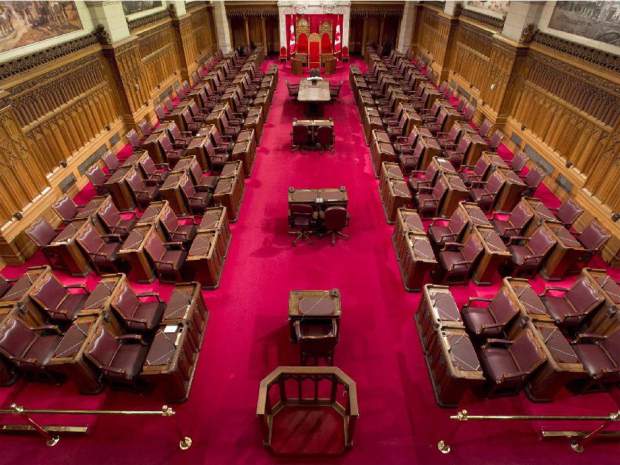In light of Stephen Harper's declared moratorium on Senate appointments, and his ultimatum that the Chamber must be reformed or be abolished, one is left to ponder, "Reformed how?" Which problem, exactly, are we trying to solve? Spending issues? Those are not unique to the Senate, nor are they an issue in need of constitutional reform. Is it their democratic legitimacy? If so, do we then need to start electing other political actors, from the Governor General to the Supreme Court, to impart some democratic legitimacy to their own roles?
Because Harper has dumped the issue of Senate reform at the feet of the provinces, first with is declaration that he would only appoint "elected" senators a process that was a non-starter for the vast majority of provinces and now with his current attempt to use his moratorium as some kind of leverage (never mind that it has all of the charm of a four-year-old threatening to hold his breath until he gets his way), it behoves us to look at just what is on offer right now when it comes to the Senate.
The abolition position is certainly the loudest, not only from the NDP but also one premier in particular, but it's one of those propositions that never really seems to get very far when you start thinking about it. Setting aside the near-impossibility of getting unanimous consent of the provinces to even do such a thing, as Quebec and the Atlantic provinces have a vested interest in maintaining the kind of added representation that the Senate offers their regions, it simply makes little sense to do away with the Chamber on the face of it.
"Oh, it's expensive." "Oh, they're so entitled." "Oh, they're a bunch of cronies." None of this is demonstrably true, given the cost-efficiency of the institution, the fact that MPs are just as entitled as Senators if not worse in many cases, or the fact that the quality of appointments is historically quite high, but they're persistent talking points used as justification. The fact that provinces no longer have upper chambers is also a non-starter for an argument because provinces aren't federations, and Canada is a dual federation linguistic and territorial and that kind of political structure demands better representation at the federal level. As well, the minority protections that the Senate offers can't be replicated in a rep-by-pop chamber like the House of Commons, hence the creation of the Senate in the first place.
There is also a conceit that doing away with the Senate would somehow force MPs to do better if they no longer have the Senate checking their homework. Let's face it the quality of work coming out of the House of Commons has been in serious decline for a while, and the more that operations are centralized in the leaders' office (especially true for both the Conservatives and the NDP), the worse it seems to get. Single positions are taken on issues, and other points of view tend to be ignored particularly if they clash with the marching orders set out by the leader's office. How this would change in the absence of the Senate is mystifying. We're already at a point where Commons committees are very nearly useless, with the majority of witnesses for contentious legislation being there solely to confirm the biases of each side. If we didn't have the Senate doing proper committee study, we would be in serious trouble.
The NDP have occasionally mused that some of the Senate's other functions, like allowing some of the more eminent persons of our country to make a contribution without running for election the Romeo Dallaire types could be fulfilled by having them appointed to a Commons elected by a Mixed-Member Proportional Representation system, giving them the "best of both worlds." Sadly, such fantastic plans not only rely on the voting system actually changing (remember, Canadians continually reject these plans when put to a vote), but it ignores the other necessary functions of the Senate, such as the institutional independence to push back against a majority prime minister (list MPs have to suck-up to the party to keep their place), or being the institutional memory of Parliament by virtue of their longevity (something that is impossible in a constantly shifting Commons).
As for the savings that eliminating the Senate would supposedly generate, it ignores the fact that all of those drafting errors that Senators catch in legislation would wind up before the courts, costing millions of dollars annually in court challenges to legislation. Those challenges would also be without the benefit of concerns about legislation being on the record as the Senate has been much more diligent about. As well, the studies that the Senate's committees produce would likely wind up requiring royal commissions to produce, at the cost of millions more costs that are already built into the Senate's budget, where better-quality reports have been produced for a fraction of the cost.
Brad Wall's notion that the Senate is unnecessary because the Council of the Federation is now fulfilling the regional representation role of the Chamber is also laughable, and needs to be called out as such. Do we really think the premiers are going to spend their time reviewing federal legislation, when it has almost nothing to do with their jurisdiction? This is even outside of those other roles the Senate plays, which there is no way the Council could even come close to replicating. Despite what Wall may believe, the Senate is about more than just regional representation.
With abolition a non-starter, proponents of reform need to start coming to the table with a realistic proposal, and no, Triple-E is nothing more than a cute slogan that also doesn't bear out in reality. If it's really the quality of senators that are the issue, then there's a solution to that a transparent process like the one Harper implemented for vice-regal appointments. Surely the premiers can get behind that one.






